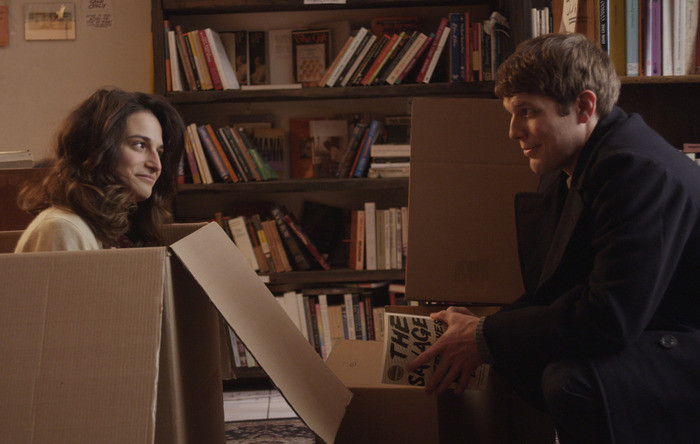A recent interview with Obvious Child director Gillian Robespierre quotes her as saying “We just didn’t see a film where the women had access to a safe, legal, abortion and decided to go through with it.” Not only does the film do this, without (as Robespierre put it) “sounding like a PSA”, but it’s quite funny. Sometimes the thorniest topics need to be looked at from a different angle – despite the limits and frustrations some may feel regarding abortion law, I do believe that there’s no harm in trying to find humour in such a thorny topic. High hopes were had for this film, then, starring comedian Jenny Slate as Donna, a disorganized twenty-something who falls pregnant after a drunken one-night stand.
In the opening seconds of the film, we meet Donna while she’s telling jokes about her vagina. It’s gross-out humour for women, and it continues throughout the movie. The audience gets fart jokes ,sex jokes and even (whisper it!) abortion jokes later on in the film – it’s a little bit unsettling to begin with, because it’s so rare to see this onscreen. However, that’s not to say it doesn’t feel totally natural for Donna to joke about like this – her character is that of the joker, the friend many people have who just don’t have huge plans for their life. Donna is not an uncommon figure in cinema, but it’s refreshing to see her in water as hot as an unwanted pregnancy. Slate herself is great in this role – she brings a definite “realness” to a character that could otherwise wander off, giggling, into cliché. Her quirks aren’t overly quirky, her faults are real and, well, obvious – making the character more engaging, as well as enraging at times. Her failings – which are mostly alcohol-fuelled – are her making as a character.
But what of the abortion plot? The first act is filled with drunken shenanigans, crying, heavy-handed sharing of life lessons and general messing – quite unexpected. It’s only when Donna realises her predicament that the film really gets going – her meetings with Planned Parenthood are touching, particularly when Donna tears up at the cost of the procedure. Touches like “$500? That’s my whole rent…” make Slate’s character resonate all the more, especially here in Ireland where that cost is added to by an airplane ticket. The topic itself is treated surprisingly sensitively, and there are some lovely moments with other characters when they discuss abortion frankly and openly. This is, after all, not “an abortion comedy” – it’s a comedy that happens to have an abortion in it.
Obvious Child is by no means perfect. There’s a bizarre, extraneous, not-even-plotline involving David Cross (who one assumes is wearing denim shorts below the frame in every scene) and score is overly hipster-y, though the Paul Simon song of the title is used brilliantly in one memorable scene. It is at times schmaltzy and heavy-handed with the life lessons – Donna’s father (Richard Kind) in particular, drips saccharine for the entire time he’s on screen. Donna’s immaturity occasionally grates to a more responsible twentysomething – but these are all small gripes. The blending of humour, romance, feminism and a thorny topic makes Obvious Child a little bit groundbreaking – it’s not going to change any minds about abortion’s validity, but the very act of talking about it and, more importantly, joking about it, makes this film powerful, even if the jokes aren’t wildly funny to the Irish audience out protesting in the streets at the moment.

